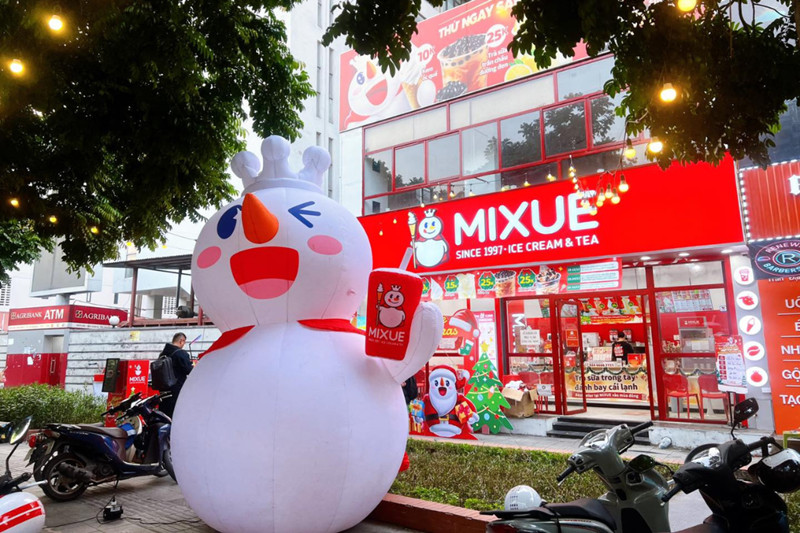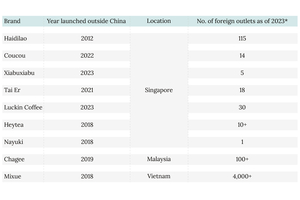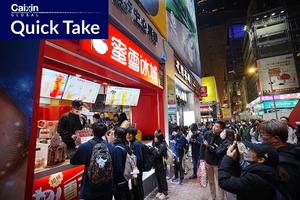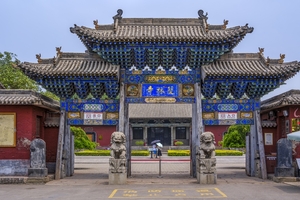In Depth: Pressure Builds on Trailblazing Chinese Bubble Tea Brand Mixue
Listen to the full version

Mixue, a Chinese purveyor of cheap, sugary bubble milk teas, has blazed a trail through Southeast Asia, using scale and supply chain mastery to upend local markets by undercutting independent sellers.
With over 36,000 stores in China and the rest of the world, Mixue Bingcheng Co. Ltd. dominates the market by offering milk tea with tapioca, ice cream, and juice at budget-friendly prices of 2 to 10 yuan (14 U.S. cents to $1.40), far less than competitors like HeyTea and Nayuki which charge double or triple that. On the Chinese mainland, many of its stores are located in smaller cities and suburban areas, offering sugar hits to price-sensitive consumers.

Download our app to receive breaking news alerts and read the news on the go.
Get our weekly free Must-Read newsletter.
- DIGEST HUB
- Mixue Bingcheng Co. Ltd. rapidly expanded across Southeast Asia with over 36,000 stores worldwide, leveraging low prices to outperform local competitors.
- The company employs a franchising strategy to fuel growth, facing rising competition from local brands and market saturation.
- Despite initial success, Mixue's IPO struggles and product homogeneity pose long-term profitability challenges, with low consumer switching costs highlighted by analysts.
Mixue, a Chinese seller of affordable bubble milk teas, has expanded rapidly across Southeast Asia by leveraging its scale and control over the supply chain to offer lower prices than local competitors [para. 1]. With over 36,000 stores worldwide, Mixue Bingcheng Co. Ltd. offers drinks priced between 2 to 10 yuan, significantly cheaper than competitors like HeyTea and Nayuki, who charge much more [para. 2]. Despite its success, Mixue’s lack of product differentiation might pose future challenges, as highlighted by its difficulty in achieving a successful IPO listing [para. 3][para. 4].
The company began its global expansion in 2016, focusing on Southeast Asia due to factors like lower labor costs and a conducive regulatory framework, with its first international store opening in Vietnam in 2018 [para. 5][para. 6][para. 7]. The choice of Vietnam was strategic, considering its proximity to China and cultural familiarity with milk tea [para. 8]. By September of the previous year, Mixue had around 4,000 stores spread across 11 countries [para. 9]. In Malaysia alone, Mixue had about 300 stores by June, and it attracts franchisees by not charging royalty fees and offering promotional support [para. 10].
Mixue’s aggressive pricing and innovative marketing strategies have significantly impacted local Southeast Asian markets. For instance, a Malaysian franchisee noted how Mixue’s low prices have driven local milk tea brands out of business [para. 11][para. 12]. While the company has halted franchisee recruitment in Indonesia and Singapore, it continues expanding in countries like Thailand, with Indonesia remaining a stronghold with over 2,400 stores [para. 13][para. 14]. The company’s franchise model, capitalizing on partnerships with smartphone distributors, accelerated its growth by leveraging the local market knowledge of these tech entrepreneurs [para. 15][para. 16]. This model inspired new competitors like MOMOYO in Indonesia, founded by a former smartphone distributor, which quickly became the second-largest chain in the country [para. 17].
Mixue’s success abroad set a precedent for other Chinese beverage brands like Heytea and Luckin Coffee to expand internationally [para. 18]. The company operates 11 overseas warehouses serving around 300 cities in Southeast Asia, using tailored import strategies to keep costs low [para. 19]. The franchising model generates over 90% of Mixue’s revenue from the sale of ingredients and equipment to franchise stores, with 99.8% of its stores being franchises as of September [para. 20][para. 21]. Despite being profitable, with net profits of 2.4 billion yuan for the first nine months of 2023, investors remain skeptical about its long-term profitability [para. 22].
Challenges from rising local competitors and market saturation are increasing, notably in Indonesia, where many new tea brands have emerged [para. 23][para. 24]. Analysts point out issues like product homogeneity and low consumer switching costs, which undermine brand loyalty and intensify competition, leading to market saturation [para. 25]. These factors have caused valuation challenges, evident in the poor stock performance of companies like Chabadao and Nayuki in Hong Kong [para. 26].
Mixue’s failed IPO underscores industry-wide challenges, attributed to a lower-than-expected valuation and unmet financing goals [para. 27]. The market's rapid saturation has slowed Mixue’s growth, particularly in Indonesia, where quick profitability is no longer assured [para. 28]. Hence, Mixue’s future in the competitive and evolving milk tea market remains uncertain [para. 29].
- Mixue Bingcheng Co. Ltd.
- Mixue Bingcheng Co. Ltd., a Chinese company, dominates the bubble milk tea market with over 36,000 stores globally, offering budget-friendly options. It rapidly expanded across Southeast Asia by leveraging supply chain mastery and low prices. However, it faces challenges from local brands, industry saturation, and concerns over long-term profitability. Its ambitious global growth has included targeting Southeast Asia, opening its first overseas store in Hanoi, Vietnam in 2018. Despite recent profitability, its Hong Kong IPO lapsed in July 2023.
- HeyTea
- HeyTea is a competitor of Mixue, known for charging double or triple the prices of Mixue's offerings. It has followed Mixue's example by expanding internationally. Despite its higher pricing, HeyTea’s international success follows from the standardization and compact nature of its business model.
- Nayuki
- Nayuki, a competitor of Mixue in the bubble milk tea market, charges significantly higher prices than Mixue. The company has faced challenges similar to Mixue, including intense competition and profitability issues. This has affected its valuation, with Nayuki losing more than 90% of its share price to date.
- MOMOYO
- MOMOYO is an Indonesian milk tea brand founded by a former smartphone distributor in 2023. It quickly became the country’s second-largest bubble tea chain with over 500 stores. MOMOYO benchmarked its products and pricing against Mixue, employing a market expansion model more akin to the smartphone industry.
- Luckin Coffee
- Luckin Coffee, inspired by Mixue's international success, is among other Chinese beverage brands expanding globally. They are tapping into foreign markets, benefiting from the minimal space required and the standardization of their products.
- 2016:
- Mixue set its sights beyond the mainland’s borders and targeted Southeast Asia.
- 2018:
- Mixue opened its first international store in Hanoi, Vietnam.
- By September 2023:
- Mixue had around 4,000 stores in 11 countries.
- In January 2024:
- Mixue filed its prospectus to the Hong Kong Stock Exchange.
- July 3, 2024:
- Mixue’s IPO lapsed.
- PODCAST
- MOST POPULAR







 Sign in with Google
Sign in with Google
 Sign in with Facebook
Sign in with Facebook
 Sign in with 财新
Sign in with 财新